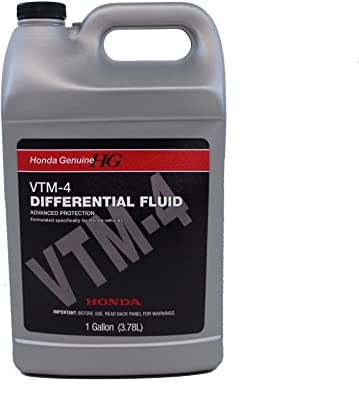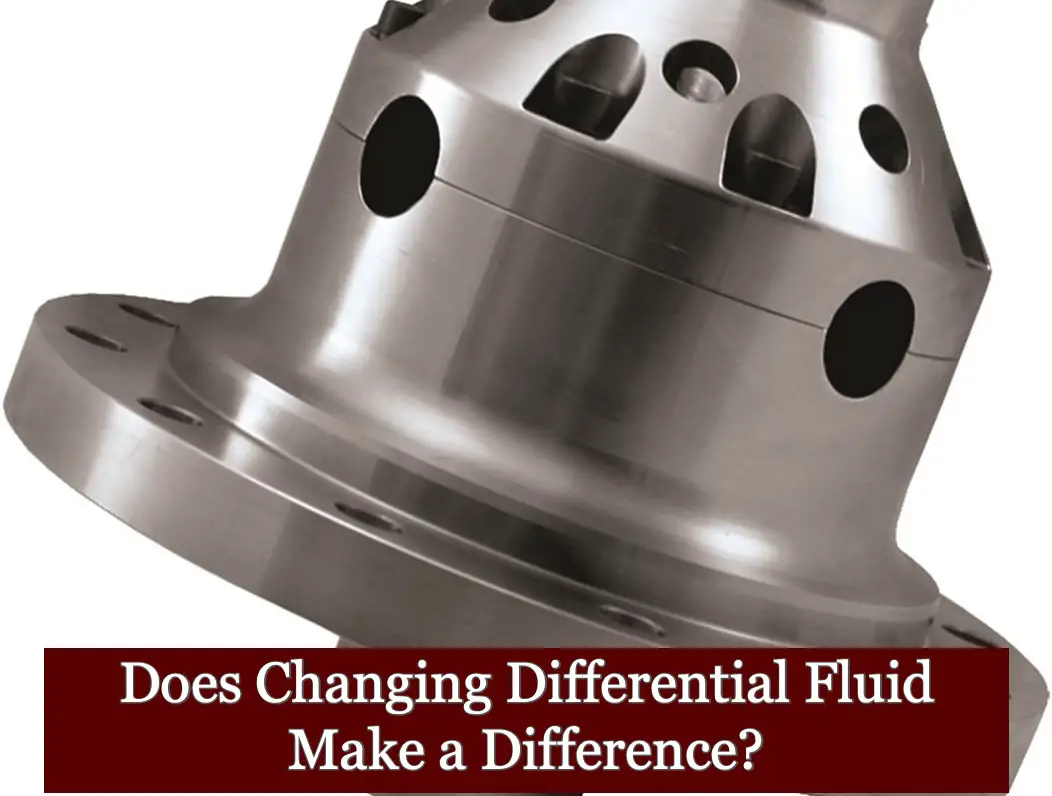Changing differential fluid significantly impacts vehicle performance and longevity. Regular fluid changes ensure optimal differential operation and prevent wear.
Fresh differential fluid reduces friction and heat, crucial for the differential’s health. Over time, fluid degrades and collects contaminants, reducing its effectiveness. Neglecting this maintenance can lead to increased wear, noise, and potential differential failure. Regular changes protect gears, bearings, and seals, maintaining smooth operation and extending the component’s life. It’s a simple yet vital aspect of vehicle maintenance.
Read also: What Is A Center Locking Differential?
What is Differential Fluid?

Differential fluid has been known to be slightly thicker in consistency than regular motor oil. When the gear comes into contact, rotating differential bearing, clutching packs, pinioning gears, and ringing gear will cause continuous friction, thereby generating heat. The differential fluid has been known to come from the lubes and driveshaft at all the metallic parts to reduce the highly heated components and prevent friction.
Signs of a Bad Differential Fluid
One of the simplest ways to answer, “Does changing differential fluid make a difference?” is to look at some signs of a bad differential fluid.
Excessive Grinding
If the differential fluid is low, it cannot lubricate the other components properly. So, all the metal parts in the differential area will come in close contact and grinding.
Wired Tire Spinning
When the differential oil is low, your car’s tires will spin unusually. This will cause severe damage to your vehicle. In some cases, it might even lead to severe accidents being caused, which might not come as expected by many.
Benefits of Changing Differential Fluid
To reap some of the best benefits of “Does changing differential fluid make a difference,” let’s look at some of the benefits of changing the differential fluid. One of the legitimate reasons most car experts cite for changing the differential liquid is the mileage. However, many more reasons may cause a change in your car long before the mileage comes into play.
Firstly, based on the recommendations posed by the manufacturer, cars will be required to undergo regular differential fluid changing anywhere from 20,000 to 30,000 miles. This will again depend upon the driving style and car you are using. Secondly, suppose you are a truck owner who undergoes heavy hauling. In that case, it can cause the fluid temperatures to rise to such levels, resulting in them burning faster than under normal conditions. This might make it possible for the vehicle’s fluids to be serviced sooner than the mileage recommendations.
How Often Should You Change the Differential Fluid in Your Car?
Regarding the question, “Does changing differential fluid make a difference?” it is crucial to remember how often the differential fluid will need to be changed in your car. In that case, there is no fast time or hard limit regarding changing the differential fluid as it will largely depend upon the manufacturer. In addition, four-wheeler vehicles have been known to have both rear and front differentials, which will require fluids at different times. That is why it will be better to check the manufacturing manual of your vehicle to know the exact miles in which the differential fluid will need to be changed.
Front Differential Fluid Change
You will most likely be required to change the front differential fluid at least every 30,000 to 50,000 miles, based on your vehicle.
Rear Differential Fluid Change
Compared to the front differential fluid, the rear differential fluid will last a long time. Even then, considering the condition, it will need to be changed within 30,000 to 60,000 miles.
Lastly, the interval for changing differential fluid may be shorter or longer, depending on your driving habits. The more you drive, the shorter the changing interval. Conversely, the less you go, the longer the gap will be.
What Are the Consequences of Not Changing the Differential Fluid on Time?
Suppose the differential fluid is not changed on time. In that case, there are inevitable consequences that might need to be borne by the vehicle owner. When the differential fluid level goes down, less lubrication will protect the gears against increased stress and heat. This environment can result in the inferior lubricants permanently losing their viscosity. In addition, when temperatures rise, lubricants will be bound to lose viscosity. The extreme pressure between gears can shear the lubricant film, causing heat and friction, ultimately creating a vicious cycle.
Signs You Need to Change Differential Fluid
Whether you will be dealing with an old differential liquid or a low one that will require changing, there are sure signs that you will need to look out for. This will also help answer the question, “Does changing differential fluid make a difference.”
Grinding or Whining Noises
The most common symptom or sign that can be found when a car is experiencing differential fluid issues is when the vehicle makes grinding noises and/or whining noises. This is because when the fluid becomes low or old, then the gears will not find itself to be properly lubricated. This tends to create excess friction between the gears, often resulting in a grinding, whining noise, or even both.
Of course, differential gears will not be the only thing that can become the source of odd noises in your car. For instance, bad wheel bearing can also create whining noises which can be found to be similar to the differential noise. Wheel bearing noises have been known to change depending on the vehicle’s speed.
On the other hand, differential noise has been known to vary depending on the engine load as well as the speed of the car. Hence, it is highly recommended that you pay close attention to how the noises will change so that it will be easier to tell them apart. An easy way to say both of these noises apart is when the car is going up a hill, and it will be required to increase the engine load and the power. However, in this case, the vehicle will not be going fast. If the noise worsens as you try to inch up the hill, it will most likely turn out to be a differential problem.
Conversely, if the noise only gets worse with speed, it is most likely to be a wheel-bearing problem. It will also be essential to note that bad tires can make similar noises. Still, they are most likely to change depending on the road’s surface, whereas bearing and differential noise do not.
Burning Smell
As mentioned, bad or low differential fluid will tend to increase the friction in the differential. More friction will tend to result in more heat being generated. If the car gets hot enough, it will likely produce a burning smell. If you own a rear-wheel drive car, it will become relatively easy to identify the scent as it will come from the back of the vehicle.
However, it will be considered to be trickier with cars that have the differential at the front as the transmission can also be found at the front. Hence, it is likely that the burning smell will either come from the transmission, differential, or even the engine. Regardless of what the source may be, the burning smell is considered to be a cause for concern.
If the smell does not go away in a few minutes, then it will be a good idea to stop driving and check the source of the burning smell. In addition, it will always be a good idea to have a fire extinguisher in case of fire so that the damage caused can be limited to a certain extent.
Vibrations
Since the differential has been known for transferring power, it can cause vibrations throughout the car. However, there might be other components in the vehicle that might be causing the vibrations. If the vibrations only occur when the steering wheel goes above 40mph, your car may need tire balancing. On the other hand, vibrations at low engine load and speed could mean that your differential fluid is low or deficient, causing issues. It is more likely to appear when turning a corner.
What Type of Fluid to Use?
While timely car maintenance has been deemed critical, using the right kind of differential fluid will be equally important. Automakers have designed each system to be compatible with specific oils and fluids. When the wrong oil or fluid is used, it will be as bad as not changing the fluid. To determine which differential fluid will be most suitable for your vehicle, check the “Fluids” or “Maintenance” section of your car owner’s manual. If you don’t possess one, you can easily find a free PDF copy on the manufacturer’s website.
How to Change the Differential Fluid?
The steps of changing the differential fluid may vary from one vehicle to the other. However, you have to be prepared with some equipment and tools to help you change the differential fluid.
- Jack stand
- Flat screwdriver
- Ratchet wrench
- New fluid recommended by the manufacturer
- Drain pan
- Old clothes, goggles, hand gloves.
Step 1: lifting the vehicle
The first step is to adorn yourself in safety gear to prevent yourself from getting messy. After that, lift the vehicle with the help of a jack to reach underneath the differential fluid plugs. Firmly stand your car on the jack stand.
Step 2: Finding the differential fluid plugs
Try finding the hexagonal or square-shaped differential fluid fill and drain plugs.
Step 3: draining the old fluid
If there are old fill and oil drain plugs, the first thing to do is release the drain plug with the wrench.
Step 4: Securing the drain plug
Once the old oil is drained, fasten the plug you have released.
Step 5: filling the differential fluid
Release the oil fill plug with a pump or fluid hose, and then fill the new oil into the differential reservoir.
Step 6: securing the fill plug
When the differential oil changes, fasten the differential fill plug and replace the housing.
Step 7: removing the jack stand
The final step is to remove the jack stand from the vehicle and gently release it. Start your engine now to check everything is okay.
Cost of Changing Differential Fluid
The average cost of changing the differential fluid is between $79 to $93. The price range is based on national averages that have been done for all vehicles and does not factor in particular make and model, fees, and taxes. Related maintenance and repairs may also be required.
Special Considerations When Changing Differential Fluid
When going to answer, “Does changing differential fluid make a difference” there are some special considerations that need to be taken into account. As mentioned above, the differential fluid is vital in ensuring you can enjoy greater control over your driving experience. Its timely and proper replacement is required to avoid overheating, which can pose a security issue. Also, suppose you consider changing differential fluid a tedious and messy task. In that case, you can always seek a professional’s help to ensure the job will be done well.
